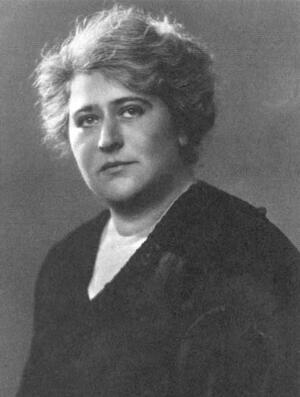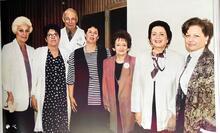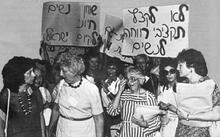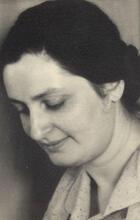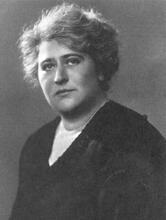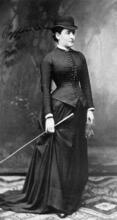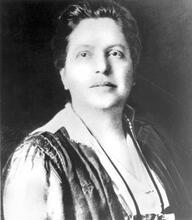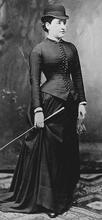Constance Amberg Sporborg
From her work with the National Council of Jewish Women to the United Nations, Constance Sporborg devoted her energies to bettering the lives of women throughout the world.
Institution: The Jacob Rader Marcus Center of the American Jewish Archives, Cincinnati, OH, www.americanjewisharchives.org and Underwood and Underwood Studios
For Constance Amberg Sporborg, knowledge was power: she spent decades educating women about their choices, from immigrants at Ellis Island to voters at the ballot boxes. Sporborg began volunteering at a settlement house at age fifteen, later moving to New York and continuing her philanthropy. From 1916 to 1921 she served as New York president of the National Council of Jewish Women, becoming national president in 1926. Among her many civic activities, Sporborg chaired the women’s exhibit at the 1933 World’s Fair and headed the women’s delegation to the Pan-American Conference in Lima, Peru in 1938. From 1946 to 1949 she served on the United States National Committee for UNESCO, and in 1946 became an accredited observer representing women’s groups to the United Nations.
Constance Amberg Sporborg was a career clubwoman who dedicated her life to the advancement of women’s rights, immigrant settlement, international organizations, and world peace. As an example of her extensive involvement in local and world affairs, she once, in the mid-1940s, simultaneously held fifteen different leadership posts in local, national, and international organizations.
Early Life and Service
Born on July 11, 1879, to Louis and Rose (Winkler) Amberg of Cincinnati, Ohio, she began her long career of community service at age fifteen by volunteering at a local settlement house. She went on to attend the University of Cincinnati, and, in 1901, earned a bachelor of science degree in languages. After completing her degree, she moved with her family to New York, where she continued her work with settlement houses, volunteering at both the Christy House and the Henry Street Settlement. In 1902, she married William Dick Sporborg, a lawyer. They had two children, Elizabeth and William Dick, Jr.
By 1916, Constance Sporborg was already contributing much of her time to civic organizations. She served as president of the New York section of the National Council of Jewish Women (NCJW) from 1916 to 1921, and in 1926, she served as its national president. The NCJW dedicated much of its activities to the development of settlement houses and assistance for immigrant women. They stationed a permanent representative on Ellis Island to interview every Jewish woman who passed through in an effort to help her assimilate more quickly to American culture and avoid prostitution. During Sporborg’s years of leadership, the NCJW was expanding its efforts to reach Jews who had settled in more rural areas as well.
Sporborg was also concerned with international issues and establishing lasting world peace. Her international interests included involvement in pan-American relations, women’s issues, and extensive service for and with the United Nations. In 1937, she took part in a seminar group studying conditions in Europe firsthand. In the 1940s, Sporborg began her commitment to the UN and its organizations. She served as a member of the U.S. National Committee for UNESCO from 1946 to 1949, was involved with the UNRRA, and was an accredited observer representing women’s groups from 1946. In addition, Sporborg headed the women’s delegation to the Pan-American Conference in Lima, Peru, in 1938.
Legacy
All of this, however, was only part of her lifelong career as a social activist. In addition to her work with the NCJW, she served as president of the New York City and State Federations of Women’s Clubs. She wrote articles and handbooks for women about congressional procedures, legislation, and voting. In 1933, she chaired the women’s exhibit at the Chicago World’s Fair.
In 1939, she was recognized for her years of outstanding community and international service, and in particular for her efforts on behalf of women, when Russell Sage College awarded her an honorary doctorate.
Constance Amberg Sporborg dedicated much of her life to bettering the lives of women and working toward a more peaceful world. While she was always active in the Jewish community, her efforts aided both Jews and gentiles at home and abroad. She died on January 2, 1961, in New York City at age eighty-one, survived by her two children and four grandchildren.
AJYB 63:562.
Obituary. NYTimes, January 3, 1961, 29:2.
Rogrow, Faith. Gone to Another Meeting: The National Council of Jewish Women, 1893–1993 (1993).
Russell Sage College. Archives. Troy, N.Y..
UJE; WWIAJ (1938).
WWWIA 6.

